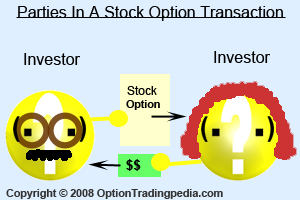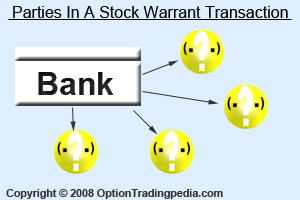What Exactly Are The Differences Between Warrants and Stock Options?
Differences Between Warrants & Options - Introduction
Stock options and Stock warrants are two extremely popular derivative instruments that are traded in stock and derivative exchanges all over
the world.
Because stock options and warrants share the same leverage characteristics, they have been commonly assumed to be the same instrument
called different names. Nothing is further from the truth. Even though stock options and stock warrants behave in almost the same fashion and
can be traded in the same fashion, they are actually fundamentally different instruments.
This tutorial will get to the very DNA of stock options and warrants to understand their differences.
Differences Between Warrants & Options - Contracting Parties
Stock options are contracts between a person or institution owning a stock or willing to buy a stock and another person who either wants to buy or sell those stocks at a specific price. Read our Stock Options Tutorial for full explanations. In this aspect, stock options are just like the option you sign when you buy a house from a seller of that house. It's a contract between a party who owned the stock through purchase from the open market and another party who wish to buy that stock from the writer of the options contract. It is essentially a contract between two investors. In this aspect, a Market Maker is an investor as well because they too accumulate those stocks and options from the open market.

Stock Warrants on the other hand are contracts between investors and the bank or financial institution issuing those warrants on behalf of the company whose stocks the warrants are based on. When you buy warrants, it is these financial institutions selling it to you and when you sell warrants, it is these same financial institutions buying from you and not another investor. Companies issuing warrants do so in order to encourage the sale of their shares and to hedge against a reduction in company value due to a drop in their company share price. Therefore, when you buy a warrant, you are helping the company issuing it no matter if it gets exercised or not. However, in a stock option transaction, the company itself does not receive a direct benefit at all. It is the winning investor who enjoys the profits. The issuing bank or financial institution also acts as market makers for the warrants that they issue, hence there are no third party market makers like those making markets for stock options.

In fact, you will find out as you go along this tutorial that most of the differences between stock options and warrants stem from the fact that the writer for warrants is not another investor but a bank acting for the company in question.
Differences Between Warrants & Options - Customizability of Terms of Issue
Standardized stock options all around the world are issued with a fixed structure and framework with a common method of calculation,
standardized policy of strike difference, standardized contract size and standardized terms of exercise / delivery. All these rules are
set by the individual exchanges so that all participants may "play this game" on equal terms. This standardization is necessary as
stock options are contracts between individual investors who may not be professional financial institutions.
Differences Between Warrants & Options - Shorting
Because stock options are contracts between individual investors, anyone could produce a new option and throw it for sale into the market by "shorting" or "writing" using a Sell To Open order. Warrants, on the other hand, are issued by the issuing bank or financial institution only, hence they cannot be shorted.
Differences Between Warrants & Options - Exercise & Delivery
Stock options are either American, allowing the investor to exercise at any time during the life of the options, or European style, allowing the investor to exercise only during expiration. Warrants are only European style, which are automatically exercised during expiration if they are in the money. Remember, the issuers of warrants are the issuing banks directly representing the companies issuing the shares. These companies win as long as their shares get sold and capital raised. This is unlike stock options where the investor selling the options could lose significant amount of money when call options they wrote gets in the money and then subsequently exercised.
Differences Between Warrants & Options - Pricing
Because warrants are European style only, it's extrinsic value is significantly lower than that of American style stock options. American style stock options have higher extrinsic value due to the added benefit of allowing the holder to exercise the options at anytime during the life of the stock options. The higher extrinsic value of american style options makes credit strategies much more profitable than European ones.
Differences Between Warrants & Options - Trading Strategies
As stock options can be bought or shorted, there are a myriad of hedging and trading strategies that can be used, including credit strategies. As stock warrants can only be bought, it can only be traded like stocks without the flexibility and versatility that stock options can offer. Get a full list of Options Strategies.
Differences Between Warrants & Options - Conclusion
Even though Warrants share the same trading characteristics of Stock Options, it is really a totally
unique trading instrument. Warrants are created more like over-the-counter
exotic options where the terms of each warrant is
highly customizable to meet the needs of the issuer and then securitized and publicly traded. In fact, the very same warrants
that are publicly traded in derivatives exchange are traded in
over-the-counter markets (OTC) as well, while in the US, only non-standardized options are traded OTC. In short, warrants
are a form of exotic option that are capable of being traded publicly.
Here is a list of main differences between Stock Warrants and Stock Options.
| Stock Warrants | Stock Options | |
| Contract Terms | Defined by issuer | Standardized by exchange |
| Trading | Cannot be freely shorted | Can be shorted |
| Strike Prices | Only those issued | Usually a lot more strike prices and expiration |
| Delivery | Delivered by issuer | Delivered by investors |
Due to these differences, especially the fact that warrants cannot be freely
shorted, the
hedging possibilities as well as the
kinds of options strateiges that can be executed using
warrants are a lot lesser than stock options. In fact, the only hedging strategies one can execute with warrants is the
Protective Put strategy and
delta neutral hedging using put warrants,
which acts in almost the exact fashion as a put option.
| Javascript Tree Menu |
Important Disclaimer : Options involve risk and are not suitable for all investors. Data and information is provided for informational purposes only, and is not intended for trading purposes. Neither www.optiontradingpedia.com, mastersoequity.com nor any of its data or content providers shall be liable for any errors, omissions, or delays in the content, or for any actions taken in reliance thereon. Data is deemed accurate but is not warranted or guaranteed. optiontradinpedia.com and mastersoequity.com are not a registered broker-dealer and does not endorse or recommend the services of any brokerage company. The brokerage company you select is solely responsible for its services to you. By accessing, viewing, or using this site in any way, you agree to be bound by the above conditions and disclaimers found on this site.
Copyright Warning : All contents and information presented here in www.optiontradingpedia.com are property of www.Optiontradingpedia.com and are not to be copied, redistributed or downloaded in any ways unless in accordance with our quoting policy. We have a comprehensive system to detect plagiarism and will take legal action against any individuals, websites or companies involved. We Take Our Copyright VERY Seriously!
Site Authored by